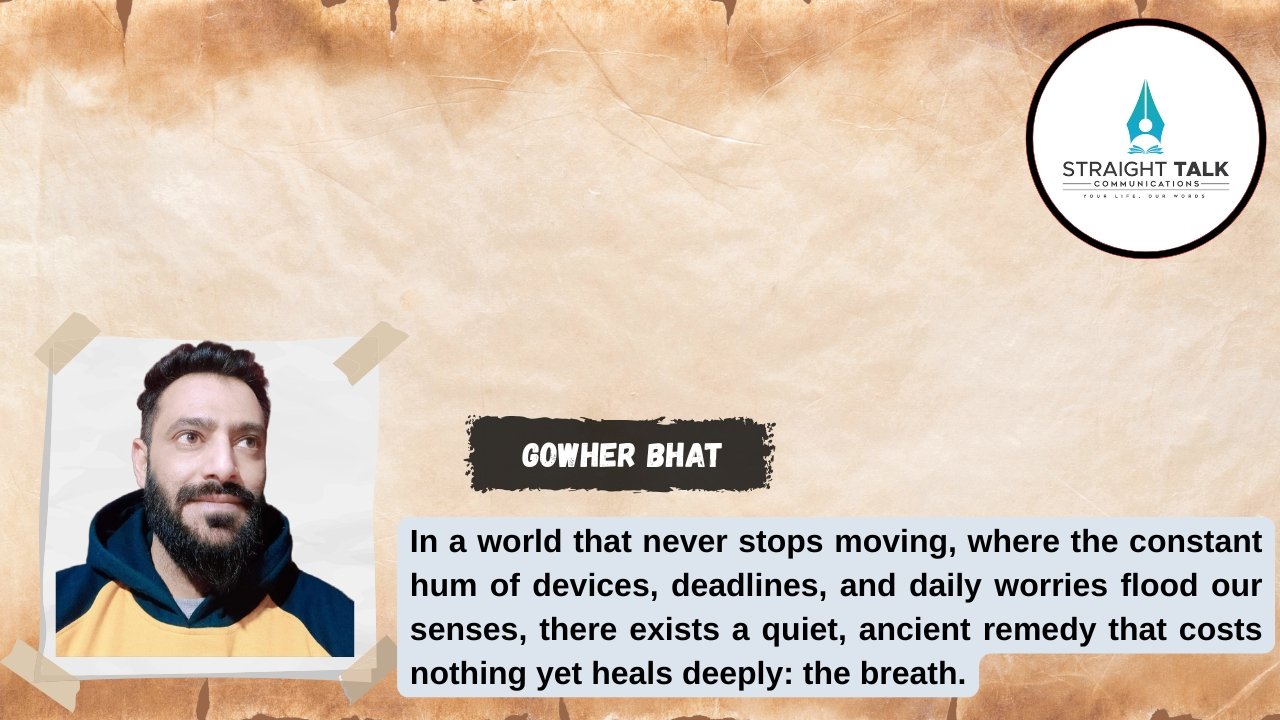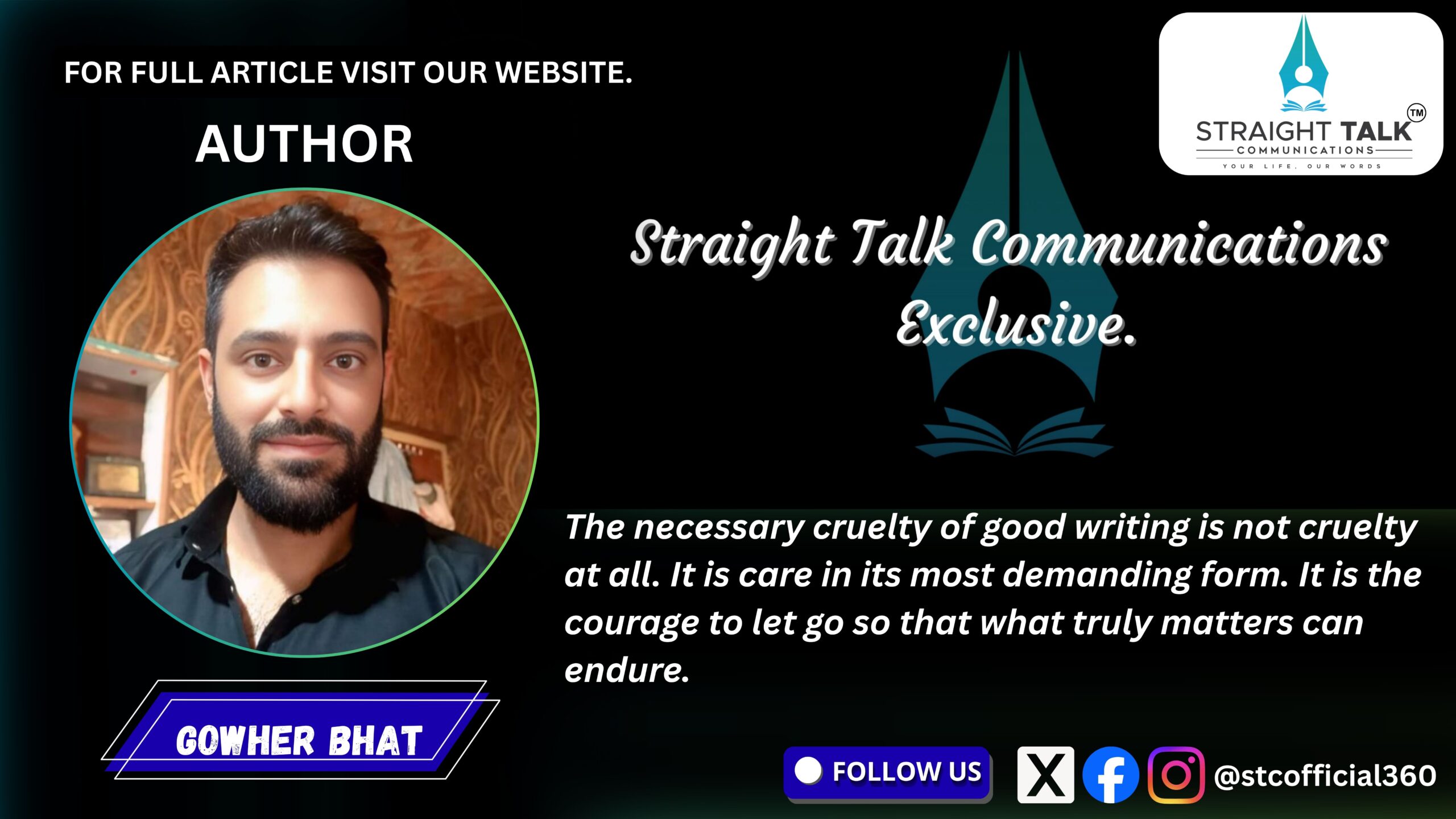Inhale Strength, Exhale Stress: The Magic of Deep Breathing

Gowher Bhat
In a world that never stops moving, where the constant hum of devices, deadlines, and daily worries flood our senses, there exists a quiet, ancient remedy that costs nothing yet heals deeply: the breath.
Yes, something as simple as breathing – when done with awareness and intention can transform your mental clarity, physical well-being, and emotional balance. This isn’t just poetic sentiment; it’s a scientifically supported truth that many experts and wellness practitioners continue to emphasize.
The Forgotten Superpower
Breathing is the first thing we do when we come into this world, and the last thing we do when we leave. Yet somewhere between those two sacred moments, we forget how to breathe properly.
Most of us breathe just enough to get by – shallow, unconscious, hurried breaths that barely engage our lungs. But deep breathing, slow, mindful, and rhythmic does more than keep us alive. It shifts us from survival mode to a place of calm and clarity. When practiced regularly, it becomes a subtle yet powerful form of healing, awakening a profound sense of inner peace.
Why does this matter? Because most of us are unknowingly stuck in a stress response and our bodies are constantly flooded with adrenaline and cortisol. Whether it’s work stress, emotional turmoil, or overstimulation from technology, the nervous system rarely gets a chance to relax. Deep breathing gives it that chance.
A Portal to Calm
Have you ever noticed how your breath becomes shallow when you’re anxious, angry, or overwhelmed? It’s a natural reaction – our bodies preparing to “fight or flee.” But the miracle of breathing lies in its two-way relationship with the nervous system.
Just as stress shortens our breath, slowing the breath calms our stress.
When you breathe deeply, you’re essentially telling your body, “You are safe. You can rest now.” This shift from the sympathetic nervous system (fight-or-flight) to the parasympathetic nervous system (rest-and-digest) can bring almost instant calm. It doesn’t require medication or expensive equipment – just a few minutes of your time.
Even just 5 minutes of deep breathing a day can bring noticeable changes in mood, energy, and clarity.
What Science Reveals
Breathing with intention isn’t just a feel-good ritual – it’s backed by research.
A 2017 study published in Frontiers in Psychology found that slow, deep breathing significantly reduces cortisol (the body’s main stress hormone), improves emotional regulation, and enhances resilience against mental health issues like anxiety and depression.
Another study by Harvard Medical School highlighted that mindful breathing could lower blood pressure, reduce heart rate, and increase heart rate variability, a key marker of physical and emotional resilience.
These findings are not isolated. Numerous clinical trials have confirmed the positive impact of deep breathing on people with chronic pain, insomnia, digestive issues, and even autoimmune disorders.
What the Experts Say
Dr. Andrew Weil, a pioneer in integrative medicine, has long advocated for deep breathing as a core part of healing. One of his most popular techniques is the 4-7-8 method:
Inhale through your nose for 4 seconds
Hold the breath for 7 seconds
Exhale slowly through your mouth for 8 seconds
This technique, he says, acts like a “natural tranquilizer for the nervous system,” helping people fall asleep, calm nerves, and relieve anxiety.
Similarly, James Nestor, author of Breath: The New Science of a Lost Art, emphasizes that how we breathe is just as important as how much we breathe. He writes, “The perfect breath is this: Breathe in for about 5.5 seconds, then breathe out for 5.5 seconds. That’s 5.5 breaths a minute.”
That’s right – slower is better.
More Than Stress Relief
The benefits of deep breathing extend far beyond stress relief. Here’s what deep breathing can do for your mind, body, and soul:
1. Improves Focus and Clarity
When you flood your body with oxygen, your brain gets a powerful boost. You may find yourself thinking more clearly, focusing better, and making more balanced decisions. A calm mind is a sharp mind.
2. Enhances Digestion
Deep breathing improves blood flow and activates the parasympathetic nervous system, which promotes better digestion. It can also help relieve bloating and discomfort by relaxing the muscles around the digestive tract.
3. Boosts Immunity
Studies suggest that deep breathing stimulates the lymphatic system, helping the body detox more efficiently. When stress hormones decrease, the immune system functions better – making you less susceptible to illness.
4. Improves Sleep
Many people struggle with falling or staying asleep due to a racing mind. Practicing deep breathing before bed relaxes the body and mind, helping you drift into deeper, more restorative sleep.
5. Elevates Mood
By triggering the release of endorphins and calming the nervous system, breathing deeply naturally improves mood. It brings a sense of grounding, peace, and emotional stability even in the midst of chaos.
How to Begin Your Deep Breathing Journey
You don’t need a yoga mat, incense, or hours of free time. All you need is your breath and a few quiet moments.
Try This Simple Exercise Right Now:
1. Sit or lie down in a quiet place. Close your eyes.
2. Place one hand on your chest and the other on your abdomen.
3. Breathe in deeply through your nose for 4 seconds, allowing your abdomen to rise.
4. Hold your breath for 4-6 seconds.
5. Exhale slowly through your mouth for 6-8 seconds, feeling your body soften.
6. Repeat for 5–10 cycles.
Notice how your body feels after just a few minutes. Lighter? Calmer? More awake?
That’s the magic of deep breathing.
In the rush of daily life, it’s easy to forget to pause and breathe. Consider setting hourly reminders on your phone with prompts like:
“Take 3 deep breaths.”
“Pause. Breathe. Reset.”
“Inhale calm. Exhale tension.”
You’d be amazed how these tiny rituals anchor your day and shift your mood.
From Habit to Lifestyle
While breathing is automatic, mindful breathing is intentional. Like any habit, it gets stronger with consistency. Begin by practicing deep breathing once a day. Gradually, you’ll find yourself turning to your breath in moments of stress, overwhelm, or fatigue because your body will remember the peace it brings.
Let breathing become your anchor, your safe space, your go-to tool for inner strength. Let it be the first thing you return to when life gets noisy, confusing, or heavy.
Final Breath
Inhale strength. Exhale stress.
This is not just a poetic idea. It’s a choice – a return to a rhythm that is as ancient as life itself.
So the next time the world feels too much, don’t reach for your phone, a snack, or a distraction.
Instead, close your eyes.
Place your hand on your heart.
And take a deep, conscious breath.
You hold within you the oldest, simplest, and most reliable tool for healing. Use it.
(Gowher Bhat is a published author, freelance journalist, book reviewer, and educator based in Kashmir.)







